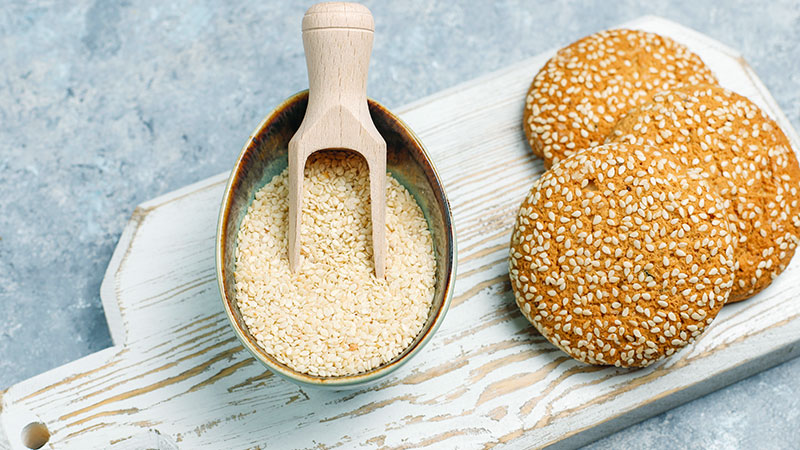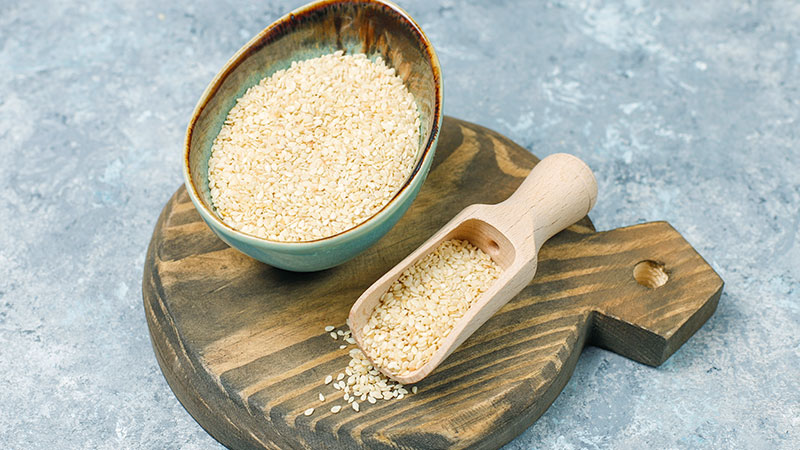Have you ever wondered how such a tiny seed can pack a significant nutritional punch? Sesame seeds, often seen as mere toppings on bread and salads, are actually a powerhouse of health benefits.
These small seeds are loaded with essential nutrients, including healthy fats, protein, fiber, and a variety of vitamins and minerals like calcium, iron, and magnesium.
They are known to support heart health, improve bone strength, enhance digestion, and boost the immune system. Furthermore, the high antioxidant content in sesame seeds helps fight inflammation and protects against chronic diseases.
Incorporating sesame seeds into your diet can be a simple yet effective way to improve overall health and well-being. Discover the myriad ways these little seeds can make a big impact on your health in the sections that follow.

8 Health Benefits of Sesame Seeds
Sesame seeds (Sesamum indicum) have been valued for centuries not only as a culinary ingredient but also for their potential health benefits. These tiny seeds are rich in nutrients like protein, fiber, healthy fats, vitamins, and minerals, making them a valuable addition to a balanced diet.
Here are twelve health benefits of sesame seeds, each discussed elaborately:
1. Rich in Nutrients

Sesame seeds are packed with essential nutrients. They are an excellent source of protein, which is crucial for muscle repair and growth, as well as for maintaining overall health.
In addition to protein, sesame seeds contain healthy fats, including omega-6 fatty acids, which support heart health and inflammation control.
They are also rich in vitamins and minerals such as calcium, magnesium, phosphorus, and iron, which are vital for bone health, energy production, and oxygen transport in the body.
Sesame seeds are particularly valued for their high content of sesame oil, which is rich in antioxidants like sesamol and sesamin. These compounds have been shown to have potential health benefits, including reducing oxidative stress and inflammation in the body.
Incorporating sesame seeds into your diet can provide a significant boost in essential nutrients that contribute to overall well-being.
2. Heart Health Benefits

The components found in sesame seeds have been linked to several heart health benefits. For instance, sesame oil contains lignans, which are polyphenolic compounds known for their antioxidant properties.
Antioxidants help protect cells from damage caused by free radicals, thereby reducing the risk of chronic diseases such as heart disease.
Moreover, sesame seeds are a good source of monounsaturated and polyunsaturated fats, particularly omega-6 fatty acids. These healthy fats have been associated with lowering LDL cholesterol levels while maintaining or even increasing HDL cholesterol levels.
By promoting a healthier lipid profile, sesame seeds contribute to reducing the risk of cardiovascular diseases such as heart attacks and strokes.
3. Bone Health Support

Sesame seeds are rich in several minerals crucial for maintaining strong and healthy bones. Calcium, magnesium, phosphorus, and zinc are all present in sesame seeds in significant amounts.
Calcium is essential for bone mineralization and density, while magnesium contributes to bone structure and strength. Phosphorus is necessary for bone formation, and zinc plays a role in bone metabolism and collagen synthesis.
Consuming sesame seeds regularly can help support bone health and reduce the risk of osteoporosis, a condition characterized by weakening bones.
The combination of these minerals makes sesame seeds a valuable addition to the diet, especially for individuals at risk of bone-related disorders due to aging or nutritional deficiencies.
4. Antioxidant Properties

Sesame seeds contain various antioxidants, including sesamol, sesamin, and tocopherols (vitamin E), which help neutralize free radicals in the body.
Free radicals are unstable molecules that can cause oxidative stress, leading to cell damage and inflammation. By reducing oxidative stress, antioxidants in sesame seeds may help lower the risk of chronic diseases such as cancer, diabetes, and cardiovascular disease.
Additionally, sesame seeds contain lignans, which are phytoestrogens with antioxidant properties. These compounds have been studied for their potential role in reducing oxidative stress and inflammation markers in the body.
Including sesame seeds in your diet can contribute to overall antioxidant support and help protect against oxidative damage caused by environmental factors and poor dietary choices.
5. Anti-Inflammatory Effects

Chronic inflammation is linked to various health problems, including heart disease, arthritis, and autoimmune disorders. Sesame seeds contain compounds like sesamin and sesamol, which have been studied for their anti-inflammatory properties.
These compounds may help reduce inflammation by inhibiting pro-inflammatory enzymes and cytokines in the body.
Additionally, the omega-6 fatty acids found in sesame seeds can contribute to anti-inflammatory effects when consumed as part of a balanced diet.
By reducing inflammation, sesame seeds may help support overall health and reduce the risk of chronic inflammatory conditions. Incorporating sesame seeds into your meals regularly can contribute to maintaining a healthy inflammatory response in the body.
6. Digestive Health

Sesame seeds are a good source of dietary fiber, which is essential for digestive health. Fiber promotes regular bowel movements and helps prevent constipation by adding bulk to stool and supporting healthy digestion.
Additionally, fiber acts as a prebiotic, feeding beneficial bacteria in the gut and promoting a healthy gut microbiome.
Moreover, sesame seeds contain lignans, which have been shown to have potential prebiotic effects by supporting the growth of beneficial bacteria in the intestines.
A healthy gut microbiome is essential for digestive health, immune function, and overall well-being. Including sesame seeds in your diet can provide valuable fiber and prebiotics to support optimal digestive function.
7. Blood Sugar Regulation

Sesame seeds may help regulate blood sugar levels due to their fiber content and unique composition of nutrients. Fiber slows down the absorption of sugar into the bloodstream, preventing rapid spikes and crashes in blood glucose levels.
This can be beneficial for individuals with diabetes or those at risk of developing the condition.
Additionally, sesame seeds contain magnesium, which plays a role in carbohydrate metabolism and insulin sensitivity. Magnesium helps cells respond appropriately to insulin, the hormone responsible for regulating blood sugar levels.
By supporting insulin sensitivity and moderating glucose absorption, sesame seeds can contribute to better blood sugar control when consumed as part of a balanced diet.
8. Skin Health Benefits

The nutrients in sesame seeds offer several benefits for skin health. Sesame oil, extracted from sesame seeds, is rich in antioxidants like vitamin E and sesamol, which help protect the skin from damage caused by free radicals.
These antioxidants may contribute to anti-aging effects by reducing oxidative stress and promoting skin cell repair.
Moreover, sesame seeds contain zinc, which plays a role in collagen production and skin tissue repair. Collagen is a protein that provides structure and elasticity to the skin, contributing to a youthful appearance.
Zinc also supports the skin’s natural barrier function, helping to protect against environmental stressors and maintaining hydration.
How Much Sesame Seeds Should You Eat A Day?

Incorporating sesame seeds into your daily diet can provide numerous health benefits, but it’s important to consume them in moderation. The recommended daily intake of sesame seeds varies based on individual dietary needs and health conditions.
However, general guidelines suggest the following:
General Recommendation
For most adults, consuming about 1 to 2 tablespoons of sesame seeds per day is considered safe and beneficial. This amount provides a good balance of nutrients without adding excessive calories.
Caloric Consideration
Sesame seeds are calorie-dense. One tablespoon of sesame seeds contains approximately 52 calories. Keeping track of your overall caloric intake is important to avoid weight gain, especially if you are on a calorie-restricted diet.
Nutrient Intake
A tablespoon of sesame seeds provides a substantial amount of healthy fats, protein, fiber, and essential minerals like calcium and magnesium. This amount helps to contribute to your daily nutritional requirements without overwhelming your diet.
Allergy Precaution
If you have a history of allergies, particularly food allergies, start with a smaller amount, such as one teaspoon, to ensure you do not have an adverse reaction. Gradually increase the intake as your body adjusts.
Digestive Considerations
Sesame seeds are high in fiber, which is beneficial for digestion but can cause discomfort if consumed in large quantities. To avoid digestive issues, stick to the recommended daily amount and ensure you drink plenty of water.
Variety in Diet
While sesame seeds are nutritious, it’s important to have a varied diet to ensure you receive a wide range of nutrients. Balance your intake of sesame seeds with other nutrient-dense foods.
Specific Health Conditions
If you have specific health conditions, such as kidney disease or a high risk of oxalate stones, consult with a healthcare professional for personalized advice on sesame seed consumption.
By adhering to these guidelines, you can enjoy the health benefits of sesame seeds while maintaining a balanced and nutritious diet.
Things to Consider While Eating Sesame Seeds

Sesame seeds are a nutritious addition to many dishes, offering a variety of health benefits.
However, to maximize their positive effects and avoid potential drawbacks, there are several factors to consider when incorporating sesame seeds into your diet.
Nutritional Content
Sesame seeds are rich in healthy fats, protein, and essential minerals like calcium, iron, and magnesium. They also contain antioxidants and vitamins such as B vitamins. Understanding their nutritional profile can help you balance your diet better.
Portion Control
While sesame seeds are healthy, they are also calorie-dense. It’s important to consume them in moderation to avoid excess calorie intake, which can lead to weight gain.
Allergies
Sesame seeds are a common allergen and can cause severe allergic reactions in some people. If you have a history of food allergies, introduce sesame seeds cautiously and consult with a healthcare professional if necessary.
Preparation Methods
To enhance the nutritional availability, consider soaking or roasting sesame seeds before consuming them. Soaking can help reduce anti-nutrients like phytic acid, while roasting can enhance their flavor and digestibility.
Whole vs. Hulled Seeds
Whole sesame seeds retain their outer hull, which contains more fiber and nutrients compared to hulled seeds. However, hulled seeds have a milder taste and are easier to digest. Choose based on your dietary needs and taste preferences.
Incorporation into Meals
Sesame seeds can be added to a variety of dishes, from salads and smoothies to baked goods and stir-fries. Integrating them into different meals ensures you receive their benefits without overwhelming your palate.
Storage
Sesame seeds contain natural oils that can go rancid if not stored properly. Keep them in an airtight container in a cool, dark place, or refrigerate them to extend their shelf life.
By considering these factors, you can enjoy the numerous health benefits of sesame seeds while minimizing potential issues.
Wrapping Up
As we see, sesame seeds are a small but mighty addition to a healthy diet. Their impressive array of nutrients, including healthy fats, protein, fiber, and essential minerals, makes them a valuable food for promoting overall well-being.
Regular consumption can enhance heart health, strengthen bones, aid digestion, and boost the immune system. The antioxidants in sesame seeds also offer protective benefits against inflammation and chronic diseases.
Whether sprinkled on salads, blended into smoothies, or used in cooking, incorporating sesame seeds into your daily meals is an easy and delicious way to leverage their health benefits.
Embrace the versatility and nutritional power of sesame seeds to support a healthier lifestyle.
